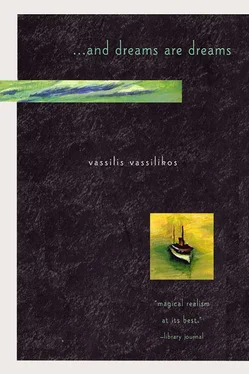Vassilis Vassilikos - ...And Dreams Are Dreams
Здесь есть возможность читать онлайн «Vassilis Vassilikos - ...And Dreams Are Dreams» весь текст электронной книги совершенно бесплатно (целиком полную версию без сокращений). В некоторых случаях можно слушать аудио, скачать через торрент в формате fb2 и присутствует краткое содержание. Год выпуска: 1995, Издательство: Seven Stories Press, Жанр: Современная проза, на английском языке. Описание произведения, (предисловие) а так же отзывы посетителей доступны на портале библиотеки ЛибКат.
- Название:...And Dreams Are Dreams
- Автор:
- Издательство:Seven Stories Press
- Жанр:
- Год:1995
- ISBN:нет данных
- Рейтинг книги:3 / 5. Голосов: 1
-
Избранное:Добавить в избранное
- Отзывы:
-
Ваша оценка:
- 60
- 1
- 2
- 3
- 4
- 5
...And Dreams Are Dreams: краткое содержание, описание и аннотация
Предлагаем к чтению аннотацию, описание, краткое содержание или предисловие (зависит от того, что написал сам автор книги «...And Dreams Are Dreams»). Если вы не нашли необходимую информацию о книге — напишите в комментариях, мы постараемся отыскать её.
...And Dreams Are Dreams — читать онлайн бесплатно полную книгу (весь текст) целиком
Ниже представлен текст книги, разбитый по страницам. Система сохранения места последней прочитанной страницы, позволяет с удобством читать онлайн бесплатно книгу «...And Dreams Are Dreams», без необходимости каждый раз заново искать на чём Вы остановились. Поставьте закладку, и сможете в любой момент перейти на страницу, на которой закончили чтение.
Интервал:
Закладка:
Doña Rosita prayed to the Holy Virgin and then they went out to the courtyard, where an upper gallery over the white stone terrace looked out onto the sea.
The sun had long since disappeared behind the mountains of Arcadia, leaving the clouds to keep alive its memory; they too would soon become ashes. The slow-moving boat was gradually entering the gulf. It was the kind of moment that brings on ecstasy. And, as she breathed in deeply the sea air, Doña Rosita felt a wave of happiness swelling inside her: the location was beautiful, the hour belonged to her. This hour when the day burned out like a firework and when everything invited her to return to her deepest nature, which was intensely romantic.
She remembered that it was there, in that idyllic place, that she had thought that all she was missing to make the dream perfect was a white rose. The face of the Holy Virgin of the chapel, exactly like that of the sacristan, appeared to Doña Rosita like a slide projected on the firmament, and, as she saw the Virgin looking down, full of compassion and beautiful sadness, she took the hand of Don Pacifico who had been smoking next to her, and its warmth made her shiver, the same way the breeze sent a ripple over the honey-colored sea, forming pirouettes and arabesques.
And then, as if by a miracle, in front of her and a little to the left, next to the ledge of the terrace, there where the dry pine needles formed a brown cover over the white stone, there where the white had started turning darker as evening fell, a white rose appeared before her, on a delicate stem with its leaves spread out. Had it been there before and she just hadn’t noticed it? Had it been born of her strong desire? In this honey-sweet hour of the evening, with the ship as the only moving object in an otherwise immobile tableau, everything was possible. Everything.
Shaking from a happiness she had never before felt, that penetrated and tingled inside her body, she bent down and smelled the rose. It smelled as strong as one hundred concentrated roses, as if the saltiness of the sea air had tormented it, causing it to smell even stronger. Letting out a small, inarticulate cry, the cry of a happy bird, she picked the rose with trembling hands.
As if she had discovered a treasure, she brought it to Don Pacifico’s face and offered it to him.
The ship was getting closer and closer to the axis of her gaze, as unhurried as if it were being pushed by the invisible hand of the boy Jesus playing with his little boat. Finally, it dropped anchor. The noise, echoing in the empty shell of the landscape, at the same moment when the lights came on on the islet of Bourdzi and in the Acropolis of Árgos on the mountain facing them, brought her back to reality and she started telling Don Pacifico, who hadn’t been aware of what she had experienced, that she was happy because her deepest desire, to have a white rose, had been realized by the will of the Holy Virgin.
For Doña Rosita, such moments constituted
happiness. That’s what she lived for, and now, as she lay stretched out on the pavement, the strength this memory gave her made her sit up and remain deaf to the cries of her alienated would-be murderers.
The third episode that completed the first two took place in Póros, during that desperate effort Don Pacifico had made to show her, in only a few days, the hidden beauties of Greece. It was again in the evening.
They arrived via hovercraft, and after dropping off their few bags at the hotel, before night fell they took a taxi up to the monastery. It was windy. They went through the gate and up the wide concrete steps.
Something was being built here too, resembling a church, but outside the enclosure of the monastery. As they reached the top, they saw the door was closed. At their feet, over the stretch of sea between the island and Galatás, the dusky light of evening was slowly fading away, planting passionate kisses on the full lips of the land that demarcated the narrow stretch of water.
The mountain facing them projected its mass onto the water below, like a Visigoth warrior standing at ease.
Doña Rosita was enchanted by the view and the light. Soon, she overcame disappointment that the monastery was closed. Its inner wall protected them from the harsh wind. The cypress trees descended like exclamation marks to the sea; the slope rustled in the northwest wind. To the right, the pine forest shivered like the skin of an animal fearing the onset of treacherous night. Once again, Doña Rosita felt intoxicated with the beauty of the day ceding its place to the darkness; she had trouble keeping her scarf wrapped around her neck, as the wind kept snatching it away.
Then Don Pacifico, having pushed open a door, found himself in a courtyard and saw, beyond its fence, lemon trees heavy with fruit. He put his hand through an opening to pick a lemon for her. But as soon as he reached his yellow target, he heard a gentle voice coming from one of the monastery windows:
“Why are you stealing?” He turned and looked up. The face of a young man was framed by the dormer window, his hand on the shutter.
“We are not stealing,” he replied. “We are only picking a lemon. We wanted to come into the monastery to say a prayer, but unfortunately it’s closed.” The young monk didn’t see Doña Rosita leaning against the wall, her scarf standing on end, under the light that kept being swept away by the wind. Nothing else was heard. But soon, a young monk with Byzantine eyes, dressed in blue jeans, appeared at the door and held it open for them to enter. “The miracle is happening again,” thought Doña Rosita, impressed by the young man whose liquid eyes, under this metaphysical light, excited her, as she later confessed to her friend when he kept asking her, insistently, whether she would have slept with the young monk.
“Yes, I would have slept with him,” she admitted, choked with a shame she was not ashamed of, because, within the sacred space of the monastery, everything was sanctified by a power that was not of this world, this prosaic, explicit, crawling world, but that sprang from other forces. These forces keep us suspended like puppets from invisible strings, making us act out our earthly comedy until they decide to pull us upward, where playacting has no place, since we are rejoined with the whole from which we were only temporarily detached.
Walking in the courtyard of the monastery, Doña Rosita once again felt that shiver of sacredness run through her body. Inside the church, she stood before the ancient, heavy icon stand, which, like a mirror leaning against the wall at a thirty-degree angle, let her see her reflection from head to toe. Its carvings impressed her. The icons were worthy of the best Giottos. The miraculous icon of the monastery, the Virgin Mary Source of Life, stood outside the icon stand, on a wall to the left. That was where she bent down and prayed, while the young monk kept silent watch. And once again she was overwhelmed by her communion with the divine, as she had been at the Monastery of the Vlattades, and at the chapel at Nafplion. For the third time in just a few days, she felt the gift of tradition. She felt faith laying its benevolent hand upon her.
Everything was mystical in this isolated
monastery, far away on the island. In none of these three places had there been any other secular people.
The people were in the jungle of the cities, where, at this moment, hit by other people’s wheels, she lay, having miraculously escaped death. The jungle was people. God had long since abandoned them and withdrawn to his shelter, where only through prayer and fasting could man find him.
Having dropped a generous donation into the monastery’s collection box, Doña Rosita bought two reproductions of the icon of the Source of Life, one for herself and one for her mother, and thanked the young monk for letting them come in at such a late hour. As she was leaving, the inner courtyard of the monastery did not remind her in the least of The Name of the Rose , which she had just finished reading, the same way Orthodoxy had nothing in common with
Читать дальшеИнтервал:
Закладка:
Похожие книги на «...And Dreams Are Dreams»
Представляем Вашему вниманию похожие книги на «...And Dreams Are Dreams» списком для выбора. Мы отобрали схожую по названию и смыслу литературу в надежде предоставить читателям больше вариантов отыскать новые, интересные, ещё непрочитанные произведения.
Обсуждение, отзывы о книге «...And Dreams Are Dreams» и просто собственные мнения читателей. Оставьте ваши комментарии, напишите, что Вы думаете о произведении, его смысле или главных героях. Укажите что конкретно понравилось, а что нет, и почему Вы так считаете.












